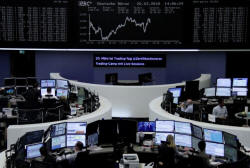Stocks struggle as earnings hopes compete with China
growth fears
 Send a link to a friend
Send a link to a friend
 [July 16, 2018]
By Tommy Wilkes [July 16, 2018]
By Tommy Wilkes
LONDON (Reuters) - European stock markets
struggled on Monday as expectations for a flurry of bumper corporate
earnings and merger speculation fought with fears about the escalating
trade conflict between Beijing and Washington.
Data showing China's economy and factory production growth had slowed
sent Asian markets lower at the start of the week, as investors fret an
escalating trade battle between China and the United States may soon
start to damage the real economy .
European shares, which have rallied off three-month lows in July, mostly
opened higher although the gains were limited and temporary.
Germany's DAX <.GDAXI> was the biggest riser, up as much as half a
percent before settling up 0.1 percent. France's CAC 40 <.FCHI> traded
down 0.27 percent and the pan-European STOXX 600 <.STOXX> was 0.14
percent lower.
Basic resources <.SXPP> and autos <.SXAP> were among the
worst-performing sectors, as both rely on solid Chinese growth. Merger
speculation concerning industrials helped outweigh the Chinese data.
The MSCI world equity index <.MIWD00000PUS>, which tracks shares in 47
countries, was flat on the day.

"The [Chinese] numbers were not way out of line and slower activity
numbers were kind of priced in," said Ian Williams, a strategist at Peel
Hunt.
"Despite all the noise around China and Trump, you are going to get a
real indication of macroeconomic health much more from company
management. I suspect that's what the focus will be for the next two to
three weeks."
Fears of a broader and deeper trade conflict have kept markets edgy for
months now, but the sell offs have been short-lived because most
investors are confident that the dispute will blow over and that robust
global economic growth is here to stay.
With dozens of European and U.S. companies reporting their
second-quarter numbers this week, investors will be looking for any
warnings that the trade battle is hurting corporate projections.
JP Morgan equity strategist Mislav Matejka said earnings results in both
the U.S. and Europe would likely be strong, beating expectations by a
good 4-5 percent. He noted that trade headlines might be losing some of
the "shock value as many investors now expect further bad news on this
front."
The S&P 500 e-mini futures <ESc1> treaded water on Monday, pointing to a
flat opening on Wall Street after solid gains on Friday.
COOLING CHINA
The Chinese data showed its economy grew 6.7 percent in the second
quarter of 2018, cooling from the 6.8 percent growth registered in each
of the previous three quarters.
[to top of second column] |

The German share price index, DAX board, is seen at the stock
exchange in Frankfurt, Germany, March 20, 2018. REUTERS/Staff/Remote

The figures came in line with market forecasts, but new data showing
slower-than-expected growth in China's industrial output pointed to slowing
momentum.
The data worries investors because it highlights an economy slowing just as
trade war headwinds are gathering.
"The question is what happens when tariffs spill over into real data. I heard my
economist saying that some of the Fed regional reports already point to some
worries there," said ING strategist Benjamin Schroeder.
"So this makes the Powell speech important this week, if he makes any comments
on how the trade tariffs may affect the U.S. economy," he said, referring to
U.S. Federal Reserve chair Jerome Powell's scheduled testimony to lawmakers on
Tuesday.
High-grade euro zone government bond yields hovered near recent lows as
investors sought out safer assets.
Moves in currencies were muted.
Both the dollar <.DXY> and the yen <JPY=>, which tend to outperform when trade
war worries flare as investors rush to buy assets perceived to be safer, were
down on the day, suggesting investors were not too worried about the Chinese
data.
The euro gained 0.3 percent to $1.1720 <EUR=>, recovering some of last week's
losses.
China's yuan <CNY=CFXS> weakened following Monday's data release, but later
recovered. In the offshore market <CNH=EBS> it rose 0.3 percent to 6.6899 yuan
per dollar.
Oil prices extended earlier losses. U.S. crude <CLc1> fell 1.6 percent at $69.88
a barrel, sent lower by easing concerns about supply disruptions. Brent crude
<LCOc1> fell 1.86 percent at $73.93 per barrel.

Gold prices <XAU=> recovered from a seven-month low on the weaker dollar.
Emerging market stocks slipped - MSCI's index <.MSCIEF> fell 0.3 percent - on
the softer China data while a tepid dollar boosted currencies.
(Additional reporting by Helen Reid and Abhinav Ramnarayan in London, Editing by
William Maclean)
[© 2018 Thomson Reuters. All rights
reserved.] Copyright 2018 Reuters. All rights reserved. This material may not be published,
broadcast, rewritten or redistributed.
Thompson Reuters is solely responsible for this content. |